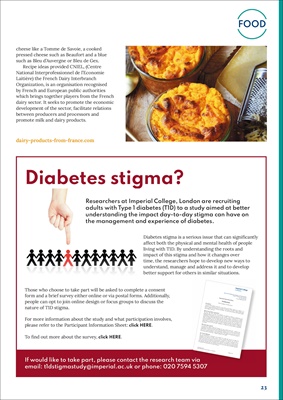
23
FOOD
cheese like a Tomme de Savoie, a cooked
pressed cheese such as Beaufort and a blue
such as Bleu d'Auvergne or Bleu de Gex.
Recipe ideas provided CNIEL, (Centre
National Interprofessionnel de l'Economie
Laitière) the French Dairy Interbranch
Organization, is an organisation recognised
by French and European public authorities
which brings together players from the French
dairy sector. It seeks to promote the economic
development of the sector, facilitate relations
between producers and processors and
promote milk and dairy products.
dairy-products-from-france.com
Diabetes stigma?
Researchers at Imperial College, London are recruiting
adults with Type 1 diabetes (T1D) to a study aimed at better
understanding the impact day-to-day stigma can have on
the management and experience of diabetes.
Diabetes stigma is a serious issue that can significantly
affect both the physical and mental health of people
living with T1D. By understanding the roots and
impact of this stigma and how it changes over
time, the researchers hope to develop new ways to
understand, manage and address it and to develop
better support for others in similar situations.
Those who choose to take part will be asked to complete a consent
form and a brief survey either online or via postal forms. Additionally,
people can opt to join online design or focus groups to discuss the
nature of T1D stigma.
If would like to take part, please contact the research team via
email: t1dstigmastudy@imperial.ac.uk or phone: 020 7594 5307
For more information about the study and what participation involves,
please refer to the Participant Information Sheet: click HERE.
To find out more about the survey, click HERE.
T1D-Stigma Study Page 1 of 6
Egality Participant Information Sheet v1.0 19/03/2024
Department of Metabolism, Digestion and Reproduction
St Mary's Hospital, London, W2 1NY
Tel: 020 7594 2460
nick.oliver@imperial.ac.uk
Participant Information Sheet
T1D-Stigma Study
Chief Investigator: Prof Nick Oliver
Introduction
You are being invited to take part in this clinical study. Before making your decision, it is
important you understand why the research is being done and what it entails. Please take
time to carefully read the following information. You may wish to discuss with others before
participating. Thank you.
What is the purpose of the study?
We know that some people with diabetes can experience feelings of disapproval and
judgement against them as a result of their condition, which is described as a feeling
stigmatised or experiencing stigma and that this can be distressing. We would like to assess
how this affects a wide range of people with the condition, in order to understand who is more
likely to be affected, how it can affect them and why they feel this way. The results of the
study will identify ways we can reduce the effect of stigma on people living with diabetes, as
well as ways to intervene in society to prevent it. Because this study intends to understand
stigma in all people living with type 1 diabetes, it is helpful for as many people to participate
as possible.
Why have I been chosen?
You are being invited to take part because you are a person with type 1 diabetes who
consented to be contacted for this study after hearing about it from our work with community
organisations. Taking part will involve completing a questionnaire, and if you wish you can
also opt in to being contacted in the second phase of the project involving focus groups to
discuss the issues around type 1 diabetes stigma in more depth.
Do I have to take part?
No. Your participation is voluntary. If you decide not to take part, this will not affect the
standard of care that you normally receive. If you do decide to take part, you are free to
withdraw at any time and you do not have to give a reason. If you were to withdraw, we will
remove any names and personal contact details and would not contact you for further phases
of the study should you have consented to this, however, we will retain the pseudonymised
data that was collected with your consent will still be used for the study. No further data will
be collected and there will be no further follow-up.